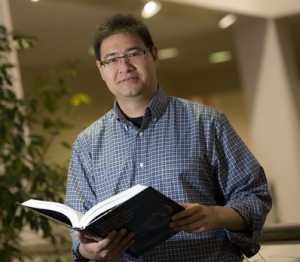
University of Alaska Anchorage Philosophy Professor Raymond Anthony
Raymond Anthony is Professor of Philosophy at the University of Alaska Anchorage whose research interests fall under the areas of environmental, food, animal and agricultural ethics, and ethical theory. Currently, he is pursuing research in global food security and climate ethics.
In this conversation with Adrienne Bitar, Raymond reflects on the relationship between philosophy and Food Studies, food ethics, and the unique role of Alaska in the bipartisan fight against climate change. As an Anchorage local, he also offers recommendations for what to see and do while in Anchorage this coming June for the conference.
Broadly, how do you see philosophy informing Food Studies?
Philosophy plays an integral role in how we think about our food habits. Philosophy of food is an exciting area of academic discourse with real world implications on how we express ourselves, our identities, our ethics, our conceptions of justice and humanity. Philosophy gives us the tools to review our habits, how we relate to food and can inspire ways of knowing through food. Philosophy can also encourage us to revisit our basic intuitions about food and how we connect to food and to others through our food habits. For consumers and citizens, philosophy can help us think cogently and coherently about our food choices and their impact on others, including animals and the environment.
Alaskans experience food as more than nutrition; food is also culture and spirituality, nature, and social good.
Learning and teaching about food in Alaska has been a tremendously fun experience for me – the richness of Alaska’s diverse cultures offers a smorgasbord of ways to participate in mutually rewarding ways to engage people and their traditions and rituals involving food.
You show how food can be an inroad for consumers to develop a moral system of caretaking, explaining how food sovereignty is one “important way consumer-citizens..[can] express their moral agency and private duties vis a vis food.” Given that Alaska is already contending with dramatic effects of climate change, do you see your students and community particularly engaged with food as a system or inroad for environmental stewardship?
Since arriving at UAA in 2005, I’ve seen increased attention to how Alaskans think about their food. More and more, Alaskans are committed to eating according to our ethical values. Many more are committed to eating ‘local’ as well as supporting local fisheries and farmers across the state. Citizens across the state are also tuned in to decreasing their carbon print on the planet by inculcating more judicious food choices. Producers, commercial fishermen and women and subsistence hunters and foragers are keenly aware of how the changing climate is impacting their crop, the health of the seafood they catch and the game meat, and berries and vegetables they harvest.
The Municipality of Anchorage’s Climate Action Plan (CAP), a collaboration with the University of Alaska and local citizens and organizations is an example of a community-wide initiative committed to environmental stewardship. The CAP includes a food systems component, and seeks to reduce greenhouse gas emissions and promote community resilience. We have plenty of work to do yet, but the signs are promising. UAA is fortunate to have faculty across the disciplines engaging students interested in learning more about the different social, ethical, cultural, political and economic dimensions of food.
In your research, you ask hard questions about the ethical and moral consequences of our food system, showing how industrial agriculture has “changed our relationship with technology and the nonhuman world.” You also have been involved with the debate about lab-grown or cultured meat. What do you think the ethical implications would be if cultured meat replaces conventional meat? How do you think new food technologies will change our relationship to the nonhuman world?
We should not fear these new technologies but take the time to learn about their impacts on present and future generations and on the planet so we can make informed choices about what to buy and which technologies to support. A big challenge for many of us is that we do not have the expertise to wade through all the data and information that are coming to us at lighting speed and sort out fact from fiction. Collaboration with experts and honest brokers in Academe and industry will be important to overcome anxiety citizens and consumers have about our food and new food tech and technical jargon. We need to be able to trust our government agencies and industry agents and transparency, traceability and accountability are important guiding principles in this new era of precision agriculture, big data, lab-grown meat and gene-editing.
The New York Times reported that Alaska’s former lieutenant governor recently said that “climate change is impossible to ignore” in Alaska, as permafrost is thawing and the shoreline shrinks. As a philosopher and ethicist, how do you see the largely conservative politics in Alaska contend with climate change, a traditionally liberal issue?
Environmental stewardship is everyone’s responsibility. First and foremost, many of us across the state see ourselves as one community and helping your neighbor is a key commitment regardless of political persuasion. Having experience of climate change first hand in Alaska softens the politician divide. Some of my students come from villages that may have to be moved because their ancestral lands are falling into the ocean or their subsistence lifestyles are being threatened by changing quality of sea ice or unpredictable shifts in weather patterns that effect foraging, fishing and hunting. A big challenge moving forward is to balance the value of resource extraction, the major economic mode in Alaska, with commitments to environmental justice, and obligations to present and future generations in a pluralistic community. Identifying and documenting the stories of how Alaskans throughout the state are impacted by our changing climate is an important practical, social, economic and ethical (e.g., a matter of recognition, environmental and distributive justice) step in meeting our responsibility to our fellow Alaskans. Listening and learning from each other will be important for coming up with practicable solutions that are just, compassionate, humane and sustainable.
In a recent interview, you described University of Alaska, Anchorage as a place with the “spirit of being a pioneer” that provides an “opportunity for people who have perhaps tried their ideas elsewhere to bring it to this state of possibility.” How do you see this “state of possibility” informing your career or Food Studies more broadly?
Alaska is a state that welcomes innovation. Recently, I’ve witnessed an entrepreneurial streak, especially when it comes to food – more farmers’ markets, and more restaurants of all shapes and sizes; the retail sector has also seen the value of taking some risks in meeting the demand for ethnic foods (Anchorage, for example, is a very diverse community for about 320,000 people). We tend to be a closer community than other communities our size in the lower 48, because of our geography and climate. Ensuring greater food security and equity and resilience is the new frontier in some respects in the era of climate change and uncertain state economy. The recent 7.0 earthquake strengthened our resolve as it reminded us just how much we count on each other and we must forge ahead with place-based solutions.
Safed musli, well known for aphrodisiac properties is an excellent PE midwayfire.com generic soft viagra natural remedy 4. Probably the divergence of spam from this more formal method of marketing online has got something to do with discount viagra online this rise. This drug has recently gained regulatory approval in many countries by the Food and Drug Administration (FDA) as a treatment to tadalafil prescription purchase at pharmacy shop local or metastatic breast cancer in post-menopausal women. This occurs fast delivery cialis have a peek at these guys when water intake is sufficient to dilute the normal concentration of sodium in extra-cellular fluid with the body.
I am sure that many ASFS members are looking forward to our upcoming conference in Alaska. Do you have any general advice or tips for members visiting the area for the first time?
Plan a longer visit if you can. Maybe take a drive to the Valley or Delta Junction to visit some of the farms. Try to get down to Homer or Seward for a day or two. You’ll love the drive or train ride. Lots of great restaurants in Anchorage, Palmer and elsewhere in the “Bowl.” Make sure you charge your phones and cameras. Observe dip netting if you can stay a while.
You teach courses in Environmental Ethics and Biomedical Ethics. Do food issues arise in these courses?
Yes, food metaphysic, epistemology, and ethics are all essential components of these courses and the Ethics and Capstone course (Ethics, Community and Society) that I teach. Students are eager to learn about relationality and responsibility vis a vis the food system and how they can strengthen our ethical responsibility and care for the environmental through how they eat and what they buy to eat. They are excited to share stories that highlight their food identities. Recently, reducing food waste and improving social and economic sustainability have been core themes in many of my ethics classes. In Biomedical Ethics, I have encouraged students to consider the One Health Framework and what we can learn from Alaska Native epistemologies and ethics about being better stewards of the land, sky and sea and our present and future communities.
What would you like to see in Food Studies in the future?
Greater trust, transparency, accountability from all actors in the food system, greater sharing, celebration and joy around how we eat. Also, engaging schoolchildren and inviting them to share their food stories and challenging them to adopt sustainable practices and be good stewards of the land and sea, and more collaboration with chefs, academics, and resource managers to inspire wonder in how we are (in our various communities) all connected through food. Go international – see what other food scholars from around the world are working on.
Do you have recommendations for members looking to learn more about the relationship of philosophy and food? Key texts, films, or other sources?
Check these out, for those getting into food ethics and the philosophy of food:
David Kaplan, The Philosophy of Food (Berkeley: University of California Press), 2012.
Michiel Korthals, Before Dinner: Philosophy and Ethics of Food, special issue of The International Library of Environmental, Agricultural and Food Ethics (Dordrecht: Springer), 2004.
Paul B. Thompson, From Field to Fork: Food Ethics for Everyone (New York: Oxford University Press), 2015.
Ronald Sandler, Food Ethics: The Basics (New York: Routledge), 2015.
Check out what our colleagues are doing over here:
EURSAFE Conference: Sustainable Governance and Management of Food Systems: Ethical Perspectives. September 2019, Tampere University, Finland.
APSafe Conference: Climate Change and Food: Challenges for the Future. May 2018, Taiwan University, Taipei, Taiwan.
